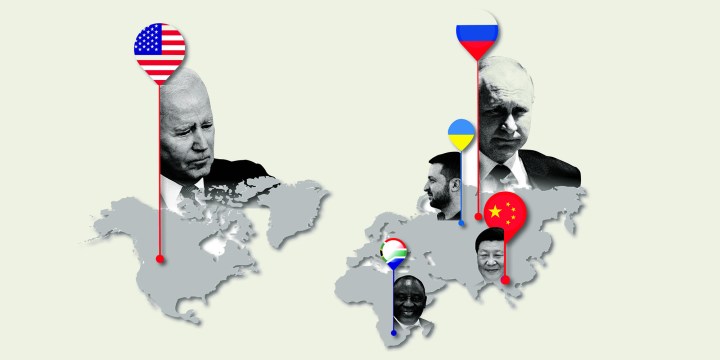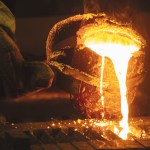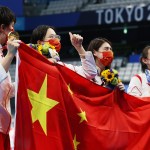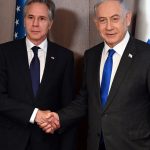NEW NEW WORLD ORDER
Tackling a world in conflict as the post-Cold War era ends

The US is seeking a new consensus to deal with a period in history in which the world order has changed and global risks include the climate crisis and tensions between the East and West.
The old post-Cold War era is over. And the US wants to work with its allies and partners, including South Africa, to shape the new post-Cold War era.
The US is “not looking to be a status-quo power”, said Matan Chorev, principal deputy director of the US State Department’s policy planning staff. It does not intend to defend the outgoing world order but rather to revitalise it.
Chorev reminded a group of South African foreign policy analysts in Cape Town recently that the planning office where he sits is the same one in which George Kennan famously conceived the post-World War 2 doctrine of “containment” of the Soviet Union.
Now, clearly, this office is deeply engaged in trying to conceptualise a new doctrine that would include constraining the evidently imperial ambitions of another Russian leader, President Vladimir Putin.
“We are now in a moment where there’s a debate about what comes next,” said Chorev, noting that, in the US and elsewhere, the failings of unfettered globalisation and the post-Cold War, neoliberal world order had been felt and recognised.
“It’s not about defending what was, but shaping what’s coming next. We have a vision for what that should be: a free, open and secure, prosperous world. A world where the foundational principles of the UN Charter are upheld, where countries are free to make their own choices, where sovereignty and all the foundational principles are defended.”
Washington sees two overarching challenges to its vision. One is “strategic competition” from revisionist, aggressive authoritarian countries. The other comes from shared global problems such as climate change and threats to health.
Meeting these challenges demands revitalising the international rules-based order to reflect new power dynamics. That includes updating and modernising institutions to make them more responsive and relevant to these challenges.
The UN Security Council, for instance, should be expanded to include new permanent members – including from Africa – beyond the current five, namely the US, Russia, China, Britain and France. And it means the US supporting the proposal that when one of the current five uses its veto on an issue, the issue must go to the General Assembly for debate and resolution. This idea was evidently inspired by the deadlock created in the council this year by Russia vetoing all resolutions condemning its invasion of Ukraine.
Shaping this new, post-post-Cold War era requires building a broad and inclusive coalition of countries that share the vision. It includes “taking a fresh look at our orientation to certain regions and institutions, to make sure that they reflect voices from the North, the South, small states, large states, developing and developed countries, and democratic and non-democratic countries”.
South Africa would be among them.
“The scale of the challenges and the opportunities before us don’t allow us to see the world through rigid ideological blocs,” Chorev added. Creating the standards and norms that govern technology, getting ahead of the climate crisis or managing the economic future demand a broad consensus.t. This year, Nato for the first time identified Russia and China as strategic rivals, as does the US in its 2022 National Security Strategy report.
Some fear that the world is not so much entering a new post-post-Cold War era but just returning to the old Cold War era, with tensions fast rising again between the West and the East.
Visit Daily Maverick’s home page for more news, analysis and investigations
Chorev disagrees that the world is regressing to a second Cold War. He noted that President Joe Biden’s meeting with Chinese President Xi Jinping at the G20 summit last month was designed in part to provide the reassurance “that we want to manage this competition responsibly”.
Biden had said after meeting Xi “that we have no interest in a new Cold War”.
“And it’s something we’ve heard loud and clear during my visit in South Africa – a real concern that a sharpening strategic competition will be at the cost of a place like South Africa and the African continent.
“The notion of a new Cold War is not predetermined. We can shape the nature of the competition so it doesn’t lead to conflict.”
And so, for instance, Biden and Xi had agreed at their meeting to restart their climate talks, which had been frozen since August when Beijing suspended all cooperation with the US in retaliation for House Speaker Nancy Pelosi visiting Taiwan.
This agreement showed that “even in a more competitive period, we can find practical, meaningful ways to cooperate on issues where our two economies, our two countries [US and China] are going to be really important. And obviously climate is at the top of that list.”
He said the world expected the US to manage this competition responsibly.
Daily Maverick asked him whether the missile that crossed the Ukraine border and hit Poland – a Nato member – in November had not illustrated starkly the danger of the Ukraine war dramatically escalating into a wider conflict between Russia and Nato, into a Third World War.
Chorev recalled that the Biden administration entered office in January 2021 amid significant concerns about the US-Russia relationship, not least because of the “brazen interference in our political system by Moscow”.
Yet Biden had striven to ensure a stable and predictable relationship, including by extending the New Strategic Arms Reduction Treaty, which reduced the number of nuclear weapons on both sides.
So it was just not true, as some claimed, that the US was looking for confrontation with Russia.
“But what’s at stake here is whether or not the foundational principles of the international order will be upheld. That includes freedom of the people of Ukraine for their territorial integrity and for their democracy.”
Chorev also insisted that, while doing everything possible to support Ukraine, the US had worked equally hard to mitigate the wider consequences of the war and the food and fuel crises, and to stop the war spreading.
Chorev said the US shared the belief of Ukrainian President Volodymyr Zelensky, South Africa and most others that the war would eventually have to end with diplomacy.
“Unfortunately and tragically, President Putin has [shown] no willingness and seriousness to engage in diplomacy,” he said. “And the aggression we’ve seen from the Russian government, its bombardment of civilian infrastructure, the war crimes that it has left in its wake every place it has left in Ukraine, make clear that unfortunately Russia is not prepared to engage in meaningful diplomacy.”
While the US has given considerable support to Ukraine, including heavy weapons, South Africa has remained studiously “non-aligned”, refusing even to condemn Russia’s invasion. It has also abstained from every UN General Assembly resolution that has condemned it.
But Chorev insists that although the two countries have discussed their disagreement at length, “we have a deep conviction that in our vision of a free, open, secure and prosperous world, countries ought to be free to make their own foreign policy choices.
“And we don’t [make] the rest of our relationship [conditional] on alignment on every issue. So you’ve seen us continue to be able to work very closely with South Africa on a whole range of bilateral issues, which you saw in the scale and scope of our strategic dialogue a few months ago.
“But also on some other issues where South Africa’s leadership, in the Ethiopian [peace] talks, for example, has been absolutely critical.”
Should South Africa be using its influence with Russia to try to end the war? “I do think South Africa’s voice matters, South Africa’s weight matters.”
And this influence had been evident when South Africa and other countries that had maintained relationships with Russia “made clear that the weaponisation of food was a profound concern of theirs”.
These interventions had “made the decisive difference” in persuading Moscow to lift its blockade of Ukraine’s Black Sea ports, allowing millions of tons of vital grain to be exported to the world, including Africa.
The Biden administration’s “core theory” was that “on every issue of consequence for the lives and livelihoods of our people, Africa’s voice – the choices that Africans make – will make a consequential difference”.
Chorev does not fear, as some others do, that the Democratic Party’s loss of the House of Representatives to the Republican Party will undermine US support for Ukraine.
“I’m confident US support will remain unwavering. And I’ll tell you why. When you drive through towns in the United States you’ll see Ukrainian flags. And it’s not because necessarily that there’s a human connection to Ukraine, although there is. It’s because the American people understand fundamentally what’s at stake there.
“I think the American people understand that the strength and unity of our democracy and the competitiveness of our economy is intrinsically linked to global affairs, and that what happens in the world is consequential to our ability to safeguard and accelerate our own domestic renewal.
“So if you look at the main issues of the day, whether it’s technology or China, the investments we need to make at home and our competitiveness, there’s actually a remarkable bipartisan consensus.
“And so my expectation is that that will remain… By and large I expect you will see more continuity than divergence.”
Does he agree, as others contend, that some of the bipartisan continuity might be the result of the Biden administration itself having continued some Trump administration foreign policies, particularly its more protectionist stance towards China?
Chorev acknowledges that the American public appreciates that the US is entering a more competitive phase with China. But he also underscores two important distinctions between the Biden and Trump postures.
One is the Biden administration’s large investments at home, mainly in infrastructure.
These flowed from “a recognition that our ability to shape the terms of [international] competition depends in large measure on our ability to invest in our competitive strengths, which we have neglected to invest in for some time, across administrations and parties.”
The second crucial distinction is that while Trump often neglected America’s allies, Biden recognises that one of America’s greatest sources of strength and advantage in managing the competition with China is “our unmatched network of allies and partners around the world”.
This includes investment not just in traditional allies in northeast Asia or Nato, but also in newer efforts like the Quadrilateral Security Dialogue among the US, Australia, India and Japan, commonly known as the Quad; the trilateral security pact among the US, UK and Australia, known as Aukus; and the US-EU Trade and Technology Council, a transatlantic forum fostering cooperation on trade- and technology-related issues, based on shared democratic values.
“And that … commitment to align ourselves with our allies and partners has been in many ways [one of] the strongest pillars of our strategy and, again, one of the important points of distinction from the previous administration,” said Chorev. DM
This story first appeared in our weekly Daily Maverick 168 newspaper, which is available countrywide for R25.





















Comments - Please login in order to comment.